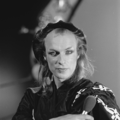Experimental rock
Experimental rock (or avant-rock)[1] is a subgenre of rock music.
Overview
Experimental rock pushes the boundaries of common composition and performance technique[2] or which experiments with the basic elements of the genre.[3] Artists aim to liberate and innovate, with some of the genre's distinguishing characteristics being improvisational performances, avant-garde influences, odd instrumentation, opaque lyrics (or instrumentals), unorthodox structures and rhythms, and an underlying rejection of commercial aspirations.[4]
History
There was always experimentation in rock music, but it was not until the late 1960s that new openings were created from the aesthetic intersecting with the social. In 1966, the boundaries between pop music and the avant-garde began to blur, and rock albums began to be conceived and executed as distinct, extended statements. Rock musicians (mostly unschooled) in the middle and late 1960s drew from the work of composers like John Cage, Karlheinz Stockhausen, and Luciano Berio.
Academic Bill Martin acknowledges: "in the case of imitative painters, what came out was almost always merely derivative, whereas in the case of rock music, the result could be quite original, because assimilation, synthesis, and imitation are integral parts of the language of rock."
Martin argued that the advancing technology of multitrack recording and mixing boards were more influential to experimental rock than electronic instruments such as the synthesizer. He allowed the Beatles and the Beach Boys to become the first crop of non-classically trained musicians to create extended and complex compositions.[nb 1]
Drawing from the influence of the Beach Boys' Brian Wilson and the Beatles' George Martin, music producers after the mid 1960s began to view the recording studio as a musical instrument used to aid the process of composition.[6][nb 2]
When the Beach Boys' Pet Sounds (1966) was released to a four-month chart stay in the British Top 10, many British groups responded to the album by making more experimental use of recording studio techniques.[9][nb 3]
In the late 1960s, groups such as the Mothers of Invention, the Velvet Underground, the Fugs, the Beatles, and the Jimi Hendrix Experience began incorporating elements such as avant-garde music, sound collage, and poetry in their work.[13]
Author Doyle Greene identifies the Beatles, Frank Zappa, the Velvet Underground, Plastic Ono Band, Captain Beefheart, and Nico as "pioneers of avant-rock", though also noted "proto-prog" bands such as Pink Floyd and the Soft Machine as an influence.[14] In addition, The Quietus' Ben Graham described duos the Silver Apples and Suicide as antecedents of avant-rock.[15]
Experimental Rock Media
- (Portrait of Les Paul, New York, N.Y.(?), ca. Jan. 1947) (LOC) (5105151726).jpg
(Portrait of Les Paul, New York, N.Y.(?), ca. Jan. 1947) (LOC) (5105151726)
- Velvet Underground & Nico publicity photo (retouched).jpg
A publicity photo of the American rock band The Velvet Underground circa 1966, around the time that they were recording their debut album The Velvet Underground & Nico. The band members are positioned around a Vox-brand ampli
- Helix, v.4, no.8, Sep. 26, 1968 - DPLA - bd488c361fd42c539d1cd78a0e4af0c1 (page 15).jpg
The Fugs' promotional poster for their album It Crawled into My Hand, Honest, 1968
- Beatles and George Martin in studio 1966.JPG
The Beatles 1964 track "I Feel Fine" was the first commercially released rock song to feature guitar feedback
- The Mothers of Invention (1968).jpg
Frank Zappa's the Mothers of Invention released Freak Out! in 1966, which inspired several experimental rock bands
- Frank Zappa - Capt. Beefheart - crop.jpg
New Haven, CT
Glenn Branca performing in New York in the early 1980s
U.S. Maple performing in September, 1999
Related pages
Notes
- ↑ Responding to oft-repeated criticisms that say the Beatles never did anything that was truly "new", Martin writes: "Rock music is synthesis and transmutation ... What was original about the Beatles is that they synthesized and transmuted more or less everything, they did this in a way that reflected their time, they reflected their time in a way that spoke to a great part of humanity, and they did all of this really, really well."[5]
- ↑ Journalist Richard Williams wrote of record producer Phil Spector: "[He] created a new concept: the producer as overall director of the creative process, from beginning to end. He took control of everything, he picked the artists, wrote or chose the material, supervised the arrangements, told the singers how to phrase, masterminded all phases of the recording process with the most painful attention to detail, and released the result on his own label."[7] According to Williams, it was Spector who transformed rock music as a performing art to an art which could only exist in the recording studio, which "paved the way for art rock".[8]
- ↑ The Beach Boys followed Pet Sounds several months later with the single "Good Vibrations" (1966), credited as a milestone in the development of rock music[10] and a prime proponent in revolutionizing rock music from live concert performances to studio productions which could only exist on record.[11] Musicologist Charlie Gillett called it "one of the first records to flaunt studio production as a quality in its own right, rather than as a means of presenting a performance".[9]Popmatters wrote: ""Its influence on the ensuing psychedelic and progressive rock movements can’t be overstated."[12]
References
- ↑ "EXPERIMENTAL ROCK (AVANT-ROCK)". The Independent. Retrieved February 16, 2016.
- ↑ Bogdanov 2001, p. 10.
- ↑ Martin 1998, p. 93.
- ↑ "Experimental Rock". AllMusic. Retrieved February 16, 2016.
- ↑ Martin 2015, pp. 13–14.
- ↑ Edmondson 2013, p. 890.
- ↑ Williams 2003, pp. 15–16.
- ↑ Williams 2003, p. 38.
- ↑ 9.0 9.1 Gillett 1984, p. 329.
- ↑ Stuessy & Lipscomb 2009, p. 71.
- ↑ Ashby 2004, p. 282.
- ↑ Interrante, Scott (May 20, 2015). "The 12 Best Brian Wilson Songs". Popmatters.
- ↑ Unterberger, p. 174.
- ↑ Greene 2016, p. 182.
- ↑ Graham, Ben. "Repetition, Repetition, Repetition: Moon Duo Interview". The Quietus. Retrieved 17 September 2016.



